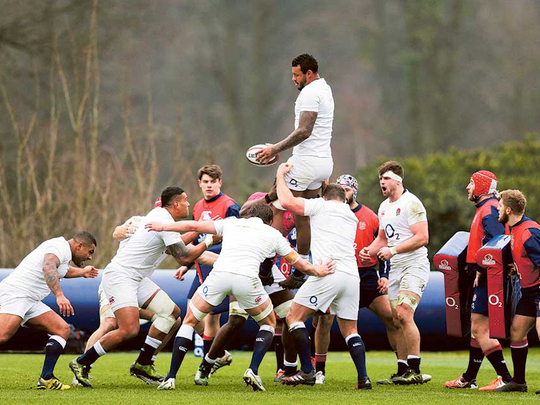
Cardiff: Eddie Jones has warned his England side to be ready for dirty tricks and “shenanigans” that might come their way from “the cunning Welsh”, as they head into the hostile atmosphere of Cardiff for the RBS Six Nations Championship game Saturday.
The England coach has already struck the first blow, though, by insisting that the roof of the Principality Stadium remain open, against the wishes of Wales who not only wanted it to be closed but who also expected it to be so given Jones’s apparent indifference on the matter earlier in the week. Wales captain Alun Wyn Jones highlighted its value when saying that “when it’s closed there is no escape for anyone”.
Jones gave short shrift to the notion that an enclosed stadium enhances the atmosphere. “I’m a coach, not entertainer,” said Jones, who betrayed his true feelings on the issue when asked if he might want to really challenge his players by actually having the roof closed. “I want to test them but I want to win,” he added. “At the end of the day the decision will be made on what I think is the best thing for the team to win.”
Jones compared the passion for the game in Wales to that in South Africa, where it is also the national sport and where various diversionary and distracting tactics can be used on opposition teams.
“Wales to me are a bit like South Africa, where the support is absolutely fever pitch,” said Jones. “Rugby means such a lot. You go to the hotel and unless you do things [to prevent it], players get rung incessantly through the night. You go to the ground and the traffic controller [on your bus] drives slower than actual traffic to make sure you are late.
“You get to the ground and there is something wrong with your dressing room — the lights are off or the heater has been switched off. They tell you one thing and something else happens.
“These things happen regularly in South Africa and regularly in Wales. So the challenge for a team is to be better than that. These are things that you can’t control. Once we go down the M4 and cross the Severn we don’t control anything. The only thing we control is our own mental state and the way we play the game.
“This week has been a great learning experience for us in understanding that. We are prepared for any shenanigans that might go on. They’re a cunning lot the Welsh, aren’t they? They always have been.”
While Jones has had many on-field matters to address during the week, he has also spent much time inuring his squad to what he calls “shadows in the corners”: those potentially unsettling thoughts of past failures or anxiety as to what is to come.
England went to Cardiff four years ago well backed to complete the Grand Slam only to be humiliated in a record 30-3 defeat. That is a big shadow.
England’s sports psychologist, former cricketer Jeremy Snape, has been much in demand in recent days, talking through various coping scenarios with those players who might need bolstering or -refocusing.
Jones is well aware of the potential detrimental effect such experiences might have on a player. “There are always shadows in the corners, and they can always come out,” said Jones.
“We have spoken about them this week. Teams go through maturity cycles and to go through one of those experiences is a life-changing experience and you never want to go back there. You don’t like that feeling [of 2013] and you learn to control your emotion to not allow yourself to get involved like that again. Every team has shadows. All the time there are experiences you have had in the past that can potentially trip you up. That is why you never win in sport, you [only] get better.”
That is what Jones’s team have managed since he took over in the wake of the dismal 2015 World Cup campaign, with Wales having triggered England’s demise at the tournament with a 28-25 win at Twickenham, their only victory in the sides’ past five encounters.
The roof issue does have consequences, though, if only because Wales are familiar with the backdrop and are boosted by the increased decibel levels.
England’s record at the Millennium Stadium is decent, with five wins in 10 matches, yet when the roof has been shut they have lost four times. Jones wants his players to front up to everything that comes their way.
“Good teams win away as well as at home,” said Jones. “New Zealand do. If you are not such a good team, you only tend to win at home because you feel comfortable and the crowd is good for you. We want to be a good team, away as well as at home.”
Despite their run of success, England head to the Principality with several issues more pressing than the need for an uninterrupted view of the Cardiff skyline.
“Our priorities have been to get ourselves right physically and psychologically,” said Jones. “Selection has been difficult.”
He has made two changes, Jack Nowell replacing Jonny May and calling up Harlequins flanker Jack Clifford to start on the open side ahead of Tom Wood. England trio Maro Itoje, Nathan Hughes and Clifford have only four starting back-row caps. Wales flankers Sam Warburton and Justin Tipuric alone have 117 caps between them. Jones is confident that his men will be up to the mark.
“I wouldn’t have picked them otherwise,’” said Jones, whose only mission is to win. That is why the roof remains open.
— The Telegraph Group Ltd, London 2017








